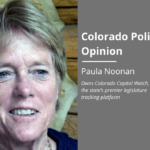Colorado not immune to the inverse effects of climate laws | SLOAN


It took a year, but the Biden administration has finally stopped pretending the Inflation Reduction Act has a whit to do with reducing inflation. At a press conference this week, White House Deputy Chief of Staff John Podesta remarked “we have to cut the carbon pollution that’s driving the climate crisis. And that’s what the Inflation Reduction Act is all about.” Treasury Secretary Janet Yellen took to the pages of The Wall Street Journal on the one-year anniversary of the acts passage to extol its virtues. She wrote, “One year ago, President Biden signed the Inflation Reduction Act into law. It’s the boldest climate action in the nation’s history-one that pushes us toward a net-zero economy by 2050.”
The only time she mentioned the word “inflation” in the entire piece was when she referred to the act by its title.
Now, terminological embellishment and rhetorical slight-of-hand is nothing new in Washington, but to have the chutzpah to call a bill that prescribes upward of $500 billion in new public spending – the root cause of general inflation – an “Inflation Reduction Act” marks a level of audacity that is almost impressive. So, the subterfuge now officially out of the way, how has the big climate bill been doing?
Stay up to speed: Sign-up for daily opinion in your inbox Monday-Friday
Well, one of its authors is none too happy. Sen. Joe Manchin (D-West Virginia, if you need reminding) said this in a statement released on the one-year anniversary: “I will push back on those who seek to undermine this significant legislation for their respective political agenda, and that begins with my unrelenting fight against the Biden Administration’s efforts to implement the IRA as a radical climate agenda instead of implementing the IRA that was passed into law.” Ouch.
Now to be fair, the good senator from West Virginia, whom I happen to have a considerable amount of respect for, has only himself to blame for allowing himself to be hoodwinked into supporting the measure in exchange for a vague pinkie-promise to enact permitting reform, but he makes an astute point: the bill’s many provisions are, like most bills Congress passes, just abstract enough to be subject to broad interpretation by the executive branch. The administration, of course, ran away with the ball, ignoring legislative intent for the sake of revolutionary progress, stoking the ire of the likes of Sen. Manchin.
Manchin’s concerns aside, the bill has been counter-productive in some of its biggest cheerleader’s stated goals. In her op-ed, Ms. Yellen wrote, “Advancing U.S. energy security also means reducing the risks of overconcentration in our critical clean-energy supply chains, which create potential choke points and heighten the likelihood of disruption.” Just so. But China supplies 60%, and refines 90%, of the world’s rare-earth minerals, and around 70% of the world’s lithium and cobalt, all critical ingredients for things like solar panels, wind turbine magnets and electric car batteries – all things the IRA subsidizes heavily. Subsidies which, incidentally, Chinese solar companies qualify for under the act.
The manic drive to enact climate-related policies is marked less by environmental results than by the adverse consequences they carry along with them, and this is not just a federal problem. This week, the Colorado Air Quality Control Commission (AQCC) is holding hearings on proposed Regulation 28, which will impose energy performance standards on commercial buildings in the state. As one would expect, the proposed rule is a model of standardized bureaucratic inflexibility, treating a facility like a hospital – with an array of diagnostic and life-saving equipment running 24 hours a day – fundamentally no different from a sealed and dark warehouse.
It also drops an enormous bill on the laps of building owners – and their tenants – who will be on the hook for the millions it will cost to install fancy new windows or electric HVAC equipment and so forth. Consider that this is being done at precisely the same moment commercial building owners are laboring under unsustainably high vacancy rates -at 22% for office space, Denver is among the worst markets in the nation – and the accompanying miseries of rising foreclosures, looming bankruptcy and the attendant miseries of inflation and supply chain complications.
The enduring lesson of economics, most succinctly elucidated by Henry Hazlitt, is in the analysis of the broader consequences of a particular act or policy. It is difficult to argue with environmental dogmatists, but environmental dogmatism requires a measure of restraint if we are to avoid the mess into which some of our governing bodies, at both the federal and state level, endeavor to usher us.
Kelly Sloan is a political and public affairs consultant and a recovering journalist based in Denver.












